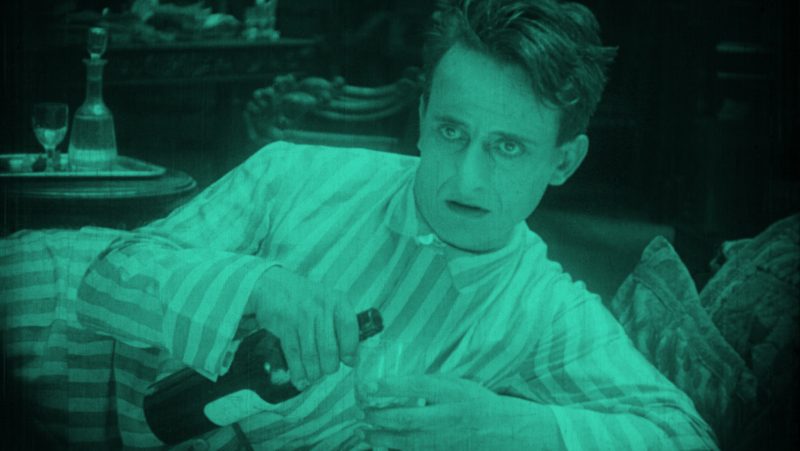SPECIAL LIVE MASTERCLASS WITH THE FESTIVAL’S MUSICIANS
A rediscovery by the Cineteca Italiana in Milan will be streamed from the Pordenone Silent Film Festival on Tuesday 6 October starting at 8.30 pm Italian time: La tempesta in un cranio (Kill or Cure, 1921), featuring Carlo Campogalliani as both director and star. He was one of Italian cinema’s most long-lived directors, active between 1914 and 1961. The film chooses a different path to that of the grand dramas and diva films that defined popular taste, offering instead a protagonist entangled in a truly innovative combination of dementia and daring adventures. Renato De Ortis is the last descendant of a noble wealthy family who lives in fear of inheriting ancestral madness. The “storm in a skull” of the Italian title – a witty nod to the nascent science of psychoanalysis – soon turns into a madcap comedy with Campogalliani outdoing himself as an athletic performer. The leading female role in La tempesta in un cranio is played by Letizia Quaranta, Campogalliani’s wife, who made many other films with him.
The son of travelling players, he had made his debut as an actor as early as 1910 before moving behind the camera. As director he found immediate success with the Maciste franchise, but both in the silent era and even more with sound (he directed Ettore Petrolini’s first talkie) he experimented with a wide range of popular genres, including sword-and-sandal features, comedies, melodramas and musicals. As a leading exponent of film as entertainment but also education, Campogalliani believed that cinema should be sincere, conveying the noblest human and social sentiments.
The short film preceding it, from the Národní filmový archiv in Prague, České hrady a zámky (Czech Castles and Palaces), makes a perfect accompaniment, featuring as both director and star Karel Hašler, the actor, singer, cabaret composer, and writer who had the original idea of creating this short as a prologue to one of his theatrical comedies. A quiet stroll by two lovers among picturesque castles suddenly turns into a comic chase: Hašler himself, expected at the Théâtre Variété in Prague, suddenly realises he is running late and begins a wild race, using every available means to cover the 30 kilometres that separate him from his audience. The film was screened at the theatre after a warning to viewers that the protagonist was delayed but that a screening would entertain them until he arrived. Creating a segue from the film’s ending to his own surprise appearance in the theatre, Hašler then burst through the screen and onto the stage. Until now České hrady a zámky was dated 1914, but thanks to research in preparation for the catalogue it has been definitively dated to September 1916.
Hašler’s fame reached its peak in the 1930s with some highly successful musicals, but his patriotic and anti-German lyrics cost him deportation to the Mauthausen concentration camp in 1941, where he was murdered. He remains an important figure of Czech popular culture; a statue was dedicated to him on the Old Castle Stairs in Prague in 2009.
As always, the film programme will be followed by in-depth discussion, with viewers able to ask questions in chat. Festival director Jay Weissberg will be joined by Matteo Pavesi of the Cineteca Italiana in Milan and musicians Günter Buchwald and Frank Bockius.
Also on Tuesday 6 October a special appointment with music is scheduled at 4 pm Italian time, as today’s masterclass on the accompaniment of silent films is live and will involve several of the Giornate’s great musicians. Philip Carli, Mauro Colombis, José María Serralde Ruiz, John Sweeney and Daan van den Hurk will join from the United States, Australia, Mexico, the United Kingdom and the Netherlands.
Today’s book presentation, starting at 5 pm Italian time, is Japonisme and the Birth of Cinema by Daisuke Miyao, who will join the discussion from San Diego; he is the author of a 2007 biography of Sessue Hayakawa, the star of Monday’s film. The current volume discusses the relationship between Japanese aesthetics and the cinema of the Lumière brothers. This will be followed by Screening Race in American Nontheatrical Film, a volume on the representation of race in American films that were not intended for general distribution, co-authored by Allyson Nadia Field, Marsha Gordon, Martin Johnson, and Tanya L. Goldman.
The Pordenone Silent Film Festival takes place thanks to the support of the Regione Autonoma Friuli Venezia Giulia, the Ministero per i Beni e le Attività Culturali – Direzione Generale per il Cinema, the City di Pordenone, the Pordenone-Udine Chamber of Commerce and the Fondazione Friuli.


 Italiano
Italiano
Recent Comments